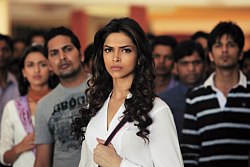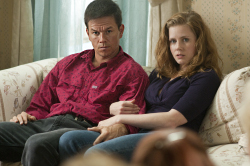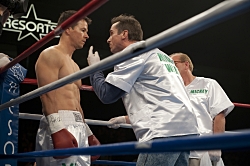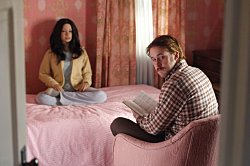Popular on LondonNet
Mixing with In The Mood For Love, SARS and four of Asian cinema’s top female stars, Wong Kar-Wai divulges why his newest film, 2046, is an expression of Hong Kong’s broken promises and regret.
ACCLAIMED Hong Kong writer-director Wong Kar-Wai’s last film was the gloriously romantic and inordinately sensual In The Mood For Love which starred Tony Leung and Maggie Cheung as neighbours in 1962 Hong Kong whose other halves are having an adulterous affair and who fall in love with each other but never consummate their relationship. All achingly restrained, repressed emotions, it was exquisitely photographed and beautifully acted, and confirmed Kar Wai’s lofty position in the art-house firmament. His latest film, 2046, has been almost five years in the making. A sort-of-sequel to ‘In The Mood For Love’, ‘2046’ tells of a playboy writer (Leung again) and his relationships with four women (Crouching Tiger’s Zhang Ziyi and Gong Li among them) several years after the end of his affair with Maggie Cheug (who appears briefly in ‘2046’). Presented alongside these sexual adventures, is one of Leung’s character’s own tales, a science fiction story in which a train heads into the future to a place called 2046 where one can capture lost memories but from where no one has ever returned. The cryptic title refers to the number of the hotel room next to Leung’s, but, most pertinently, it’s also the date of the 50th anniversary of Britain’s handover of Hong Kong to the Chinese, with Kar Wai offering up a treatise on love, memory, unfulfilled promise, and regret, as well as the impossibility of getting back one’s past.
You started making 2046 before In the Mood For Love. Why did it take so long to finish?
We had the idea for this around ’97 during the handover because at that moment the Chinese government promised that for 50 years Hong Kong wouldn’t change. 2046 is the last year of this promise and I thought it would be interesting to use these numbers to make a film about promises. At the beginning we intended to make the film like an opera, with three short stories based on Western opera. By the time we got the finance and the production together it was already the end of 1999. At the same time we were working on ‘In The Mood For Love’, so at first it was two different projects. ‘In The Mood For Love’ was a very simple story and we thought it would take two, maybe three months [to finish] and then we could start on ‘2046’ again. But somehow ‘In The Mood For Love’ took much longer than we expected, so we had to delay the production of ‘2046’. Because the cast were very busy we had to work out the schedule again, but we also had other problems. At first we wanted to shoot in Shanghai but we need to wait for the permits, and by the time we got the permits, built the sets and got the cast ready, we had the problem with SARS.
At what point did the two films become linked?
It’s because of the room numbers. One day when I was shooting ‘In The Mood For Love’ in Bangkok, in the hotel room, the room that Tony and Maggie spent their time in, I realised the room number was like 3-0-something and I said why don’t we put it as 2046? At first it was like a joke, but for me, psychologically, the two films are related. Then the structure of ‘2046’ began to change and evolved around this point. So now these two stories had something in common and the character played by Tony became the link between the two film. At first we didn’t have this character of the writer in ‘2046’, the original character was a postman.
‘In The Mood For Love’ was a film about restraint and repression while 2046 is very much the opposite, much more sexual and passionate.
For me ‘In The Mood For Love’ is a love story and the man, Tony, the writer in the film, is a family man, he believes in commitment, in marriage, he works hard, he stays at home. Afterwards, when he goes through all the things with Maggie and his miserable days in Singapore, he comes back to Hong Kong and he goes to another extreme. He’s not married, he doesn’t believe in commitment, he becomes a cynical person and prefers to stay in hotel rooms instead of finding a place to settle down. ‘In The Mood For Love’ is a relationship about these two people, even though we don’t see any physical contact between them, we can feel the love is growing. But ‘2046’ is more like a story about what love means to him. In this film Maggie is not a person, she’s an image, an ideal woman in his memory, and so he always compares this woman with all the other women he gets involved with in his life. He tries to feel that emotion again, but at the end he realises it’s not what he wants. At certain point, these two films are a mirror of each other. And if the audience hasn’t seen In The Mood For Love they should watch ‘2046’ first, and if they want to know what happened between Maggie and Tony they should watch In The Mood for Love – it’s like the missing chapter of this novel.
This time period of Hong Kong in the 60s is one you’re obviously fascinated with. It’s when you grew up, but it’s present not only in 2046 and In The Mood For Love but in Days Of Being Wild too. Why are you so enamoured with it?
I think the reason we wanted to make In The Mood for Love in the year 2000 is we realised Hong Kong was going through big changes. Hong Kong is a city that moves very fast, changes very fast, even it’s own history, so we wanted to capture some of the locations and places and even the manner and the way people live in those days in the film. We recreate all this, so on film, on celluloid, it will not change; we’re just trying to preserve that [history].
In 2046 you’ve worked with Zhang Ziyi for the first time. Why did you cast her and what she brings to the film?
I met Zhang Ziyi before she made Crouching Tiger. I still remember her in Zhang Yimou’s film [The Road Home]. She’s rather young but she’s very aggressive and very sensitive and that’s why I thought she would be good in this film. In fact, the role in ‘2046’ is extremely hard for her because she doesn’t know anything about the ballroom dances in Hong Kong during that period so I had to give her a lot of references. I had to show her some of the Shaw Brothers films that were made during that period about those women, at least to give her an idea about how they behave. And I asked William, my production designer, to give her all the costumes to dress up in and to rehearse in on her own, because those costumes restrict the body and you have to behave in a certain way.
Did Tony enjoy playing his role more this time around because his character in In The Mood For Love doesn’t say much and is very internalised in his emotions, whereas in 2046 his character is much more expressive?
I think it’s more challenging for him because he goes from one extreme to another. He’s almost a very dark character at the beginning. In the chapter between Tony and Zhang Ziyi he’s like a playboy and he always asks me, Am I the same person? And I say, Why not? It’s very hard for him, he has to work with the five strongest actresses in Asia, each of them is very attractive and they are doing a very good job and so he has to have three or four very intense relationships during few months, so it’s very hard.
What can you tell us about Lady From Shanghai, the film you’re doing with Nicole Kidman?
Well, we’re working on the script. We have ideas. Normally I will build a story around one character and I think it will be interesting to have Nicole Kidman play it as a woman who claims she came from Shanghai, and it’s very mysterious. This will be the next one and Grand Master will be the one after because Tony needs some time to practice all these martial arts skills.
Mark Salisbury









